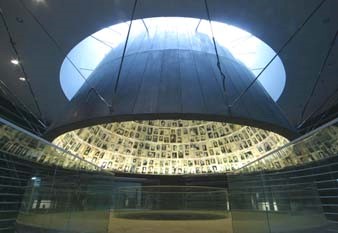Elias Bernhart: The passing on of Holocaust remembrance and its (possible) influence on the identity of young jews today
Biographical statement
I have been interested in history, cultures and religions since my childhood and read many books on these topics. At first I acquainted myself with World War I and World War II from a historical point of view, including the circumstances, developments and events between World War I and World War II, the rise of the National Socialists (and fascism in Europe in general), the subsequent war and the cruelties during the Holocaust.
The Holocaust and World War II were (and are) not only of historical interest to me, but also have an emotional and personal component. My grandfather told me how he and his family, who lived in the countryside, were confronted with increasing radicalization and the rise of the National Socialists, how he was forcibly recruited and sent to the frontline in the final years of the war, how he was captured and how he finally returned home after several years.
During my sociology studies the topics of the Nazi era and the Holocaust were only touched upon, but I was provided with analytical tools, methods and skills. In the context of my quantitative methods training I wrote a term paper about "Antisemitism and Social Status" on the subject of GFE (group-focused enmity). In a tutorial, Bruno Latour’s assertion that "we have never been modern" was compared with Zygmunt Bauman’s analysis of the concept of modernity. Can/Could there even be such a thing as modernity in view of the fact that the Holocaust, a mass genocide, was planned, organized, delegated and executed by the most modern means? Ultimately, however, Bauman considers the Holocaust to be a result of modernity.
"The Holocaust was born and executed in our modern society, at the high stage of our civilization and at the peak of human cultural achievement, and for this reason it is a problem of that society, civilization and culture." (Bauman 1989, p. 10)
The following picture illustrates my current point of few:

"The Hall of Names" with photographs of Holocaust victims. Source: yadvashem.org
Research interest
The focus of my research is the question in which manner, with which contents and from which sources or through which channels the current generation of young(ish) Jews learn about the Holocaust. I am also interested in the role which the Holocaust plays for the self-placement and identity formation of the third generation descendants and how they assess today’s treatment and discussion of the topic. The perspective of the current generation of Jews is of importance to me, as they were neither directly affected by the Holocaust, nor do they belong to the subsequent generation. The large temporal distance has an impact on their relationship to the past events. Thus various means of communication gain in importance, which may take place at home, at school, among friends, in a social environment or in media spaces. This influences their intersubjective analysis, the potential relevance for their identity formation and their assessment of the Holocaust in the present.
Goal
A qualitative open approach is planned for this social science research. Using qualitative interviews and other appropriate methods (informal talks and group discussions), I want to learn how the Holocaust and related events are passed on. I also hope to be able to examine if and how the Holocaust affects the self-placement of the younger Jewish generation.

